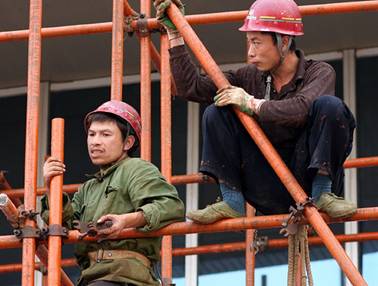Special Topic: Finding and Keeping Jobs in China
Last week, I discussed the impact the global financial crisis will have on employees around China. I explained that in many fields the balance of power in recruitment has shifted from employee to employer. Just a few months ago, employees were able to hold companies to ransom because of the chronic lack of experienced available talent. Now, with companies feeling the pinch and slashing budgets, jobs are no longer so secure and employees are unable to switch jobs for higher salaries so easily. As a consequence, we are likely to see major changes in the way employees value their jobs and companies hire their staff.
One area I touched on was the likelihood that, whilst many companies will freeze their hiring process or only bring in new people out of necessity, some will adopt a policy of strategic hiring. These companies will use the crisis as an opportunity to snare talented employees who are feeling insecure about their roles and about their future, who previously would only have been available at a premium.

Photo: ernop
Job Losses
When we hear about job losses in China it is all too easy to think only about the hordes of migrant workers in areas like Pearl River Delta who have been left without work as factories close their doors due to slackening demand from overseas. However, it is not just migrant workers and manufacturing employees who are beginning to fear for their livelihoods. This feeling of unease has spread to the ranks of talented white collar workers as well. A recent survey by Taihe Consulting (published in China Daily) revealed that 27% of major companies were actively reducing headcounts, whilst a further 53% were considering following suit – the industries most seriously affected included IT, finance and telecommunications. One example of this was telecommunications giant Nortel which, on April 2, announced its second round of job cuts in China laying off over 400 employees.
A survey conducted in the Pearl River Delta by KingField Management drew similar conclusions. It surveyed 216 firms in the region, half of whom were major multinationals including such big names as Bosch and Dupont. 44% of the HR professionals interviewed admitted that their organizations had already begun to cut jobs with a further 25% revealing that they may well soon be following suit. Again, the industries most seriously affected were IT and telecommunications.
Psychological Impact
The situation certainly looks gloomy. Even China’s Minister for Human Resources and Social Security, Yin Weimin, admitted as much when he told the 11th National People’s Congress, ”the employment situation in China is very grave," Such figures and the sudden onset of job-insecurity have caused many employees to reassess their attitudes to their roles. The prospect of receiving their pink slips has begun to play on many employees minds.
In January this year, a survey by Psychologies magazine revealed that 56% of employees were worried by the financial crisis and that only 43% remained unconcerned. And, the situation is getting worse. Just two months later, that figure had changed, with 70% of employees beginning to express serious concerns about their future. In a report published in Shanghai Daily, Dr Tan Honggang, the Head of Psychology at Peking University explained the problems employees are facing and the reasons anxiety is growing, ” People see their colleagues being called into the office and then having to pack up and leave. That causes anxiety and fear.”

Photo: Paul Keller
Strategic Opportunity
With employees across China feeling such insecurities, many will be looking for stability, as Charles Lee of recruitment firm Antal pointed this out to China Daily, “No one knows when the crisis will end, so no one exactly knows when the layoffs will cease.” He added, "Nothing beats a stable job in an economic crisis”. This mind-set is a 180 degree spin on the situation just a few months ago. Therefore, companies with the money to do so will be taking advantage of the recruitment opportunities available. The security and stability that Lee describes is the bait that many major organizations will use to lure the type of talent that, just a few months ago, would have been demanding excessive salaries and ludicrous bonuses.
Several organizations have already announced plans to expand their recruitment in specific areas. These companies include GM, Johnson & Johnson and Wal-Mart. Xie Wenjian, CEO of Johnson & Johnson Medical China told the 2009 Hewitt Best Employers in China session, "It is good to harness talent during the economic downturn," adding, “the current situation makes it easier for the companies to acquire good talent at affordable prices.” Despite its much publicized troubles at home, US motor giant GM will be looking to expand its Research and Development functions here in China.
Even with various stimulus and bailout packages, no-one knows exactly when the financial crisis will end. So, it will be impossible to accurately predict how the long the window for strategic hiring will be open. However, one thing is for sure, many companies will enjoy being in the box-seat for once.
Special Topic: Finding and Keeping Jobs in China
***
Expat Corner > Climate Change in China’s Recruitment Market
Biz China > How China Is Capitalizing on the Economic Crisis
Expat Corner > Expat Employment in China – An interview with Tim Burgess
Warning:The use of any news and articles published on eChinacities.com without written permission from eChinacities.com constitutes copyright infringement, and legal action can be taken.
All comments are subject to moderation by eChinacities.com staff. Because we wish to encourage healthy and productive dialogue we ask that all comments remain polite, free of profanity or name calling, and relevant to the original post and subsequent discussion. Comments will not be deleted because of the viewpoints they express, only if the mode of expression itself is inappropriate.
Please login to add a comment. Click here to login immediately.